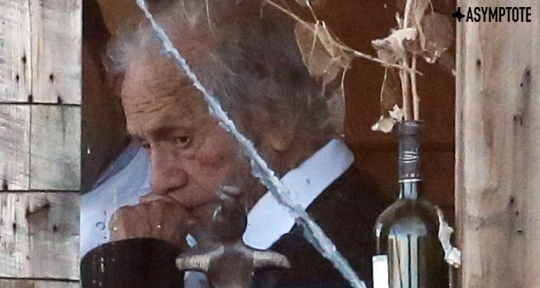Chile and its writers are no strangers to the conjugation between revolution and poetry, having long applied the ardent and inciting potentials of well-elected words to fortify and give lyric to its people’s desires for social change. Amongst the most powerful letters of the country’s struggles, the language of Nicanor Parra possessed especially an indomitable power, with its colloquial, irreverent nature lending an imitable voice to the static nature of words. Though Parra passed in 2018, his verse continues to establish itself in the public expressions of dissent, most recently revealing their prescience in regard to the severe 2019–2020 protests. In the first part of this essay, Tim Benjamin puts the poet’s legacy in relation with the social fabric of both his time and ours. Stay with us for the second part, to be published tomorrow.
I had already left Chile before the country’s 2019 uprising, but I was still living there when Nicanor Parra became a centenarian. The grand misanthrope of Chilean letters had conquered his personal century, and in a country known for wine, political troubles, and writers, there was considerable respect payed to the antipoet’s gesture toward immortality. TV and newspapers dedicated front-page space to a sort of celebratory pre-obituary, and on the night of, I went out for drinks with friends, who talked a little about Parra’s work but mostly about the idea that the old, disheveled fuck seemed to have made it to such a ripe old age just so he could take the piss out of death, like he’d done to poetry sixty years before. Death returned the favor a little under two years before the uprising, but as the introduction of Liz Werner’s overlooked 2004 “antitranslation” of his later work, Antipoems: How to Look Better & Feel Great makes clear, Parra took his joke further than anyone before him.
He didn’t coin the term. At least two poets—Vicente Huidobro and the Peruvian Enrique Bustamante y Ballivián, who published a book titled Antipoemas in 1926—had used it before him. But the concept will forever be etched alongside his name in whatever circle of the literary pantheon he comes to occupy. Parra would pass away in 2018 at the very anti-climactic age of 103, just under two years before the country’s most significant political movement since the “NO” campaign rejected Pinochetismo in 1989. And despite—or maybe because—of his reputation as the antipoet, it seems safe to say that dying before the Revolution was the kind of providential malfeasance he would have at least tried to have some fun with. Indeed, Werner’s “How to Look Better & Feel Great,” chosen in apparently intimate collaboration with Parra, is one of those disembodied parodies that exist somewhere between a wink and a groan. But it also points the way toward the mentality of a country, which, despite the crackdowns and a global pandemic, has hung a definitive asterisk onto South America’s “economic miracle.”
Parra was born in 1914 in southern Chile to a bohemian father and a mother who shows up often in his poetry as the folksy sage “Clara Sandoval.” He was the brother of the legendary folk singer Violeta Parra, whose song, “La carta” was covered by Mon LaFerte during the uprising (The letter arrives to tell me / that in my country there’s no justice / the hungry ask for bread / the military gives them lead). He studied engineering at the University of Chile, physics at Brown, and cosmology at Oxford, which may or may not have contributed to the often sideways transgressions from formalism which defines much of his output—though Werner does emphasize Parra’s occasional use of an algebraic x and shorthand descriptions of relativity. He began publishing poetry marginally in 1938, but made his name in 1954 with the publication of Poems and Antipoems. As Werner’s introduction notes, one Chilean critic wrote that Parra’s book “Returned us . . . once again! [To the fact that] everything could be said in poetry.” Camus would make a similar point a couple of years later in The Rebel, claiming that an artist’s “rebellion against reality” affirms the same motivation as that of the revolt of the oppressed. Poems and Antipoems would go through multiple editions, and the 1967 English-language version would count among its translators Allen Ginsburg, who had joined Parra in an increasingly paranoid Havana two years earlier to give out the Casa de las Americas Prize. READ MORE…

